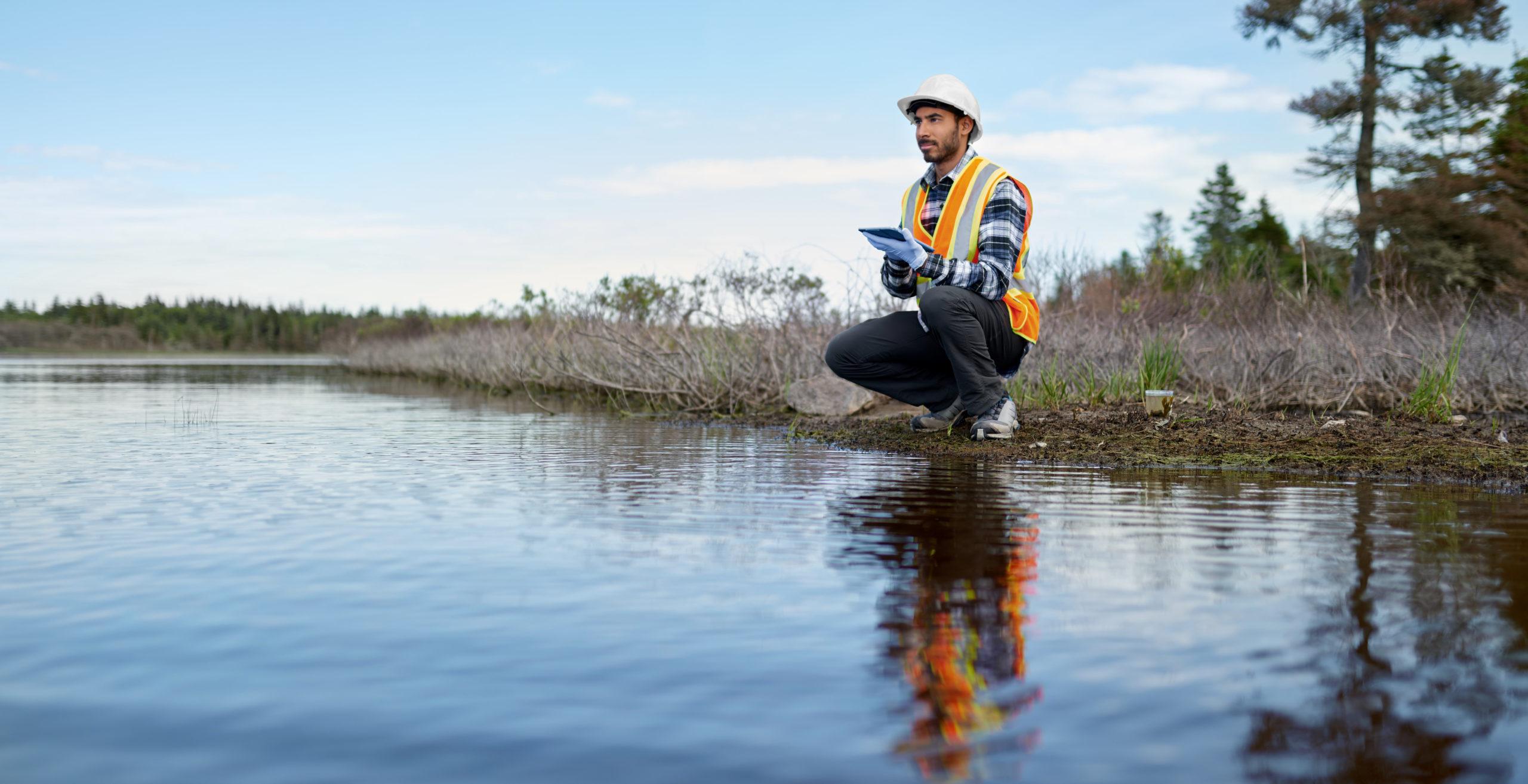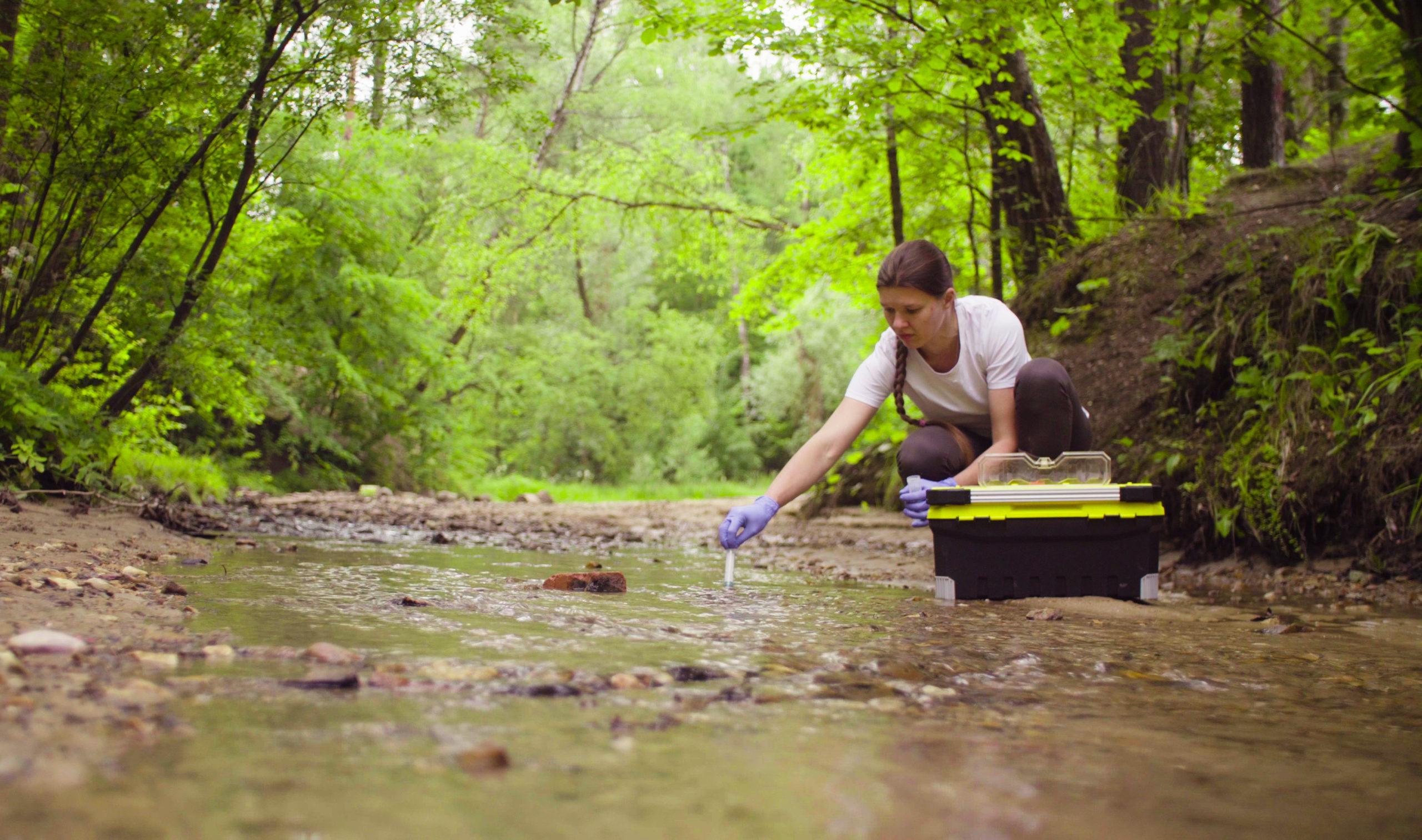
Environmental Degree Guide discusses certificates, associate degrees, bachelor’s degrees, master’s degrees, and PhDs in this field. Environmental science is an academic area that encompasses geology, meteorology, chemistry, ecology, physics, and engineering in the study of the impact humans have on the environment and environmental issues. The fields of zoology, ecology, biology, oceanography, soil science, atmospheric science, geology, chemistry, and other areas fall under the umbrella of environmental science. It is an area of science in which theories and applied aspects have been used to influence the policies of governments throughout the world.
Environmental science is different from environmental studies, which focuses more on the human relationship with the environment and its political and social aspects. For example, someone working in environmental studies will look at the political and economic aspects of climate change protocols worldwide.
These scientists will strive to understand climate change by studying its effects on the earth while finding ways to mitigate it. In other words, environmental scientists work to be able to analyze an array of different environmental problems, then come up with potential solutions. Some of these solutions can include renewable energy systems, how to control pollution, and ways to better manage natural resources.
Certificate In Environmental Science

Is Environmental Science A Good Career?
Environmental science is a promising career because graduates can earn a lucrative income while making a difference in the world. This means that environmental science careers can be enriching since graduates will work to bring about important changes that could affect the entire world. There are also various areas under the umbrella of environmental science that students can choose to pursue.
From geology, biology, zoology, and oceanography to atmospheric science, chemistry, and several other areas, there are various opportunities for graduates to work as environmental scientists. After students complete their bachelor’s degree or higher level of education in environmental science, they can choose from an array of different careers. Several of these careers include government jobs or careers in the private sector. Graduates can enter into a consulting career for businesses or work as a research scientist or in a research role.
According to the United States Bureau of Labor Statistics (BLS), state and local governments employ about 34 percent of all environmental scientists. About 9 percent of these professionals work in engineering services. And a quarter of environmental scientists work in consulting services. Most students who study environmental science are motivated to help the environment along with the animals, people, and plants that depend on it.
Students can earn salaries up to $90,000 or more per year. Furthermore, many of the positions do not require career experience. These careers can involve long hours and sometimes frustrating work. But overall, environmental science seems like a very good career for those who are passionate about the environment.
What Is A Certificate In Environmental Science For?
A certificate in environmental science can help propel graduates to higher levels in their careers within the environmental science field. Students can choose from various certifications to help them increase their knowledge and skill levels within this growing field. Environmental certifications are credentials that will let potential employers know the graduate has completed advanced training in the field of environmental science.
Students can obtain their certification in a variety of different areas of environmental science. They can opt to get certified as an environmental trainer, environmental professional, safety professional, certified environmental manager, state-licensed environmental assessor, state-licensed site professional, or even certified in hazardous materials and several other areas. These types of certifications can help a graduate to be able to work in a specific area of environmental science while increasing their income potential and career advancement potential.
How Do You Get A Certificate In Environmental Science?
Students in the field of environmental science are not required to obtain certifications but it can certainly help in their search for a job or to advance their careers. A professional certification lets employers, clients, and others know that the student is dedicated to the profession and has specialized in a specific area. Certifications can increase the skill and knowledge of the student in specific areas of environmental science and can also increase their pay in a variety of different job positions.
Additionally, they can enroll in certificate programs at the university or college of their choice. The National Registry of Environmental Professionals (NREP) and several other organizations also offer certification opportunities for entry-level careers and advanced environmental professionals already working in the field. For example, a professional already working in environmental science may want to specialize in a particular area. They can obtain a certificate as an environmental program consultant or green construction worker. These certificates will help them advance in the areas that fall under the umbrella of environmental science.
Most colleges and universities require students to hold at least a bachelor’s degree in environmental science or a related field to be able to enter into a certificate program. This will ensure that the student already has knowledge of the field and a certain amount of skills already. A certification program will enhance and increase the skills and knowledge levels that the students already possess.
Online Associate In Environmental Science

What Is An AA In Environmental Science?
For students who want to earn a degree in environmental science sooner rather than later, an associate degree may be the way to go. An associate degree in environmental science is usually offered at a Community College, Technical College, and sometimes, universities.
An associate degree in environmental studies is a program in which students will study natural earth systems and the way human beings interact with those systems. Students usually receive a foundation in chemistry, biology, and math, but there may be hands-on opportunities in natural environments.
Some associate degree programs may even collaborate with local businesses in place so that students can help resolve environmental problems in the real world. The goal of an associate degree in environmental studies is to prepare students to work in fields such as natural resource management and conservation.
An associate degree typically takes two years to complete, but many colleges, universities, and technical schools offer these programs online. Students can then work at their own pace and possibly complete an associate degree and as little as one year. This benefits graduates with an associate degree so they can enter the workforce much sooner than if they take classes in a traditional environment.
Is It Hard To Get Into An Environmental Science Career?
The hot topics in today’s world include climate change, global warming, plastic waste, and air pollution, so a career in environmental science makes perfect sense. There are so many different areas of environmental science that graduates can enter that it should not be hard to find a job. An environmental science degree is becoming increasingly valued and more relevant. Even though it is a newer field, environmental science encompasses traditional fields, such as biology and chemistry, and is recognized as a sought-after academic degree.
Graduates can combine multiple areas of science in their work. Students in this area of study will have the opportunity to participate in lab work and fieldwork. The United States Bureau of Labor and Statistics estimates that there will be job growth in the field of environmental sciences over the next decade. The Bureau also estimates that employment in the area of environmental science and protection for technicians will grow eight percent over the next 10 years. This is faster than the average for all other occupations.
What Jobs Can You Get With An Associate Degree In Environmental Science?
Graduates with an associate degree in environmental science will be in a position to be competitive in the job market arena. This is because this career area is growing rapidly, and graduates can take several different career paths. With an associate degree, students can continue their education to earn bachelor’s degrees and master’s degrees.
Some students may opt to stay in school or return to school later to earn their doctorate in environmental sciences. At this point, they can specialize in certain areas, and with all three of those types of degrees, students can earn certificates in specialized areas of environmental science. This is important in increasing their competitiveness to secure various job positions. Students can work as environmental engineers or scientists where the demand was very high regarding job availability. With an associate degree, students can work and various entry-level positions within the field of environmental science.
Students will have the option of working for government agencies as well as in the private sector for a variety of different companies. Graduates with an associate degree in environmental science can secure jobs as game wardens, naturalists, field technicians, and even nonprofit support staff. They can also work as sustainability coordinators, environmental education assistants, and in job positions that are available to support a variety of different environmental field managers and scientists.
Is An Associate’s Degree In Environmental Science Worth It?
Yes, an associate degree in environmental science is worth it for many students. This type of degree is great for those passionate about science and the surrounding environment. According to the United States Bureau of Labor Statistics, employment in environmental science is expected to grow by at least eight percent over the next ten years. Job growth is expected to be the most pronounced in the areas of management, scientific, and technical counseling services. This is because a variety of different businesses rely on these types of job positions to ensure that they are meeting all government standards and regulations.
Graduates with an associate degree in environmental science can continue their education to earn their bachelor’s degree, master’s degree, and then doctorate degree. With each degree, the number of jobs available in the field of environmental science increases as well as the amount of income they will earn each year.
Online Bachelors In Environmental Science

How Do I Get A Bachelor In Environmental Science?
A bachelor’s degree in environmental science requires that students learned a variety of different scientific fields, such as physics, chemistry, biology, ecology, and even geography. Students will do better if they have a background in these sciences ahead of time. This is a very diverse area of study that will provide students with a very versatile educational background. Environmental science encompasses various fields of science, as well as math and statistics, so students will be well-versed in analytical, scientific, and research methods.
A Bachelor of Environmental Science degree typically takes four years to complete, but students who take most of their classes, or all of them online, can finish in 18 months to two years. This is because students can work at their own pace and work ahead if they can. Students must also take elective courses while completing their bachelor of environmental science degree. This will help students to be able to specialize in certain areas of environmental science that they are most interested in, such as agriculture, ecology, or geology.
Some students may focus on environmental science as a whole and may even want to earn a double major in core science, such as physics or biology while earning their primary degree in environmental science. Students do not have to already have an associate degree in environmental science to enter into a bachelor’s degree program, but it can be helpful.
Is Bachelor In Environmental Science Worth It?
A bachelor’s degree in environmental science is worth it for students who have a passion for science and the environment. Climate change and other environmental issues, such as plastic waste and air pollution, are critical topics today. Many changes are happening to the environment, and many of those are severe issues. Students earning a bachelor’s degree in environmental science can work in this exciting and rapidly growing field to possibly help combat or resolve some of these issues in the future.
People worldwide need environmental science tests, and researchers need to gather data, translate that data, and guide others along the appropriate courses of action to help combat some of the issues like climate change. After earning a bachelor’s degree in environmental science, graduates can obtain positions within the government, private sector businesses, and other areas of the field to help make great social impacts on the world around them.
What Can I Do With A Bachelor’s In Environmental Science?
A bachelor’s degree in environmental science will open many doors for graduates. Some students may focus on certain environmental science areas, such as air pollution or agriculture. Graduates with a bachelor’s degree in environmental science can work in various positions, including agricultural scientists. In this type of position, graduates will work very closely with farmers and processing facilities to conduct various experiments to prove food processors and the quality of the food.
Graduates can work as environmental consultants, where they will guide clients on topics related to environmental management. Air pollution analysts have in-depth knowledge about the environment and air pollution and can help create sustainable relationships between humans and nature. Graduates can also secure a job as a natural resource manager, a recycling officer, an environmental educator, a meteorologist, or even a zoologist.
Some of these positions may require more education. Graduates can use their bachelor’s degree to continue on with their education to earn their master’s degree and then doctor it, so they will have even more doors open for them in the future.
Is Environmental Science A Stressful Job?
Environmental science James can be quite lucrative, with the annual average salary being right around $80,000 per year. This makes any stress for people working in this field much more tolerable. Jobs in the field of environmental science have a relatively low-stress level. This is because environmental scientists kid work in a variety of different areas of the field, so if they’re not happy with one type of job, they have many more to choose from.
Also, people working in environmental science may sometimes deal with demanding clients or hard-to-understand government rules and regulations. Still, overall they have a high level of job satisfaction. This may be credited to the fact that they do not have to sit at a desk all day since some of their work is done in the field. Most people working in the environmental science field enjoy their jobs because they are helping to make a difference in the world and positively impact people’s lives.
Online Masters In Environmental Science

Is A Master I n Environmental Science Hard?
A master’s degree in environmental science can be difficult. This is because a master’s degree in environmental science program requires students to study a wide variety of different types of sciences, including chemical, biological, and ecological. On the upside, students entering into a master’s degree program in environmental sciences are very prepared to take on the challenge. This is because they already have earned their bachelor’s degree in environmental science or a related field, and know and understand a lot of the material.
A master’s degree also allows students to specialize in certain areas of environmental science. This means students can specialize in the parts of environmental science they enjoy the most and probably have several years of experience. All master’s degree programs are quite rigorous, but since many are now offered online, students can complete what was usually a two to a five-year degree program in about 18 months or less. This is because students can work at their own pace, night or day, while also continuing to work a fuller part-time job or raising a family. Since students can work independently, the stress level is less since they do not have to fit their coursework into their already busy lives at times that are not convenient.
Do I Need GRE For A Master’s In Environmental Science?
The Graduate Record Examination, most often referred to as GRE, can be part of many colleges and universities’ application process for students entering a master’s degree program. The application process for environmental science graduate programs throughout the country can differ. Some universities and colleges may require students to take and pass the GRE, but not all of them do.
The exam is administered to students to gauge their academic ability and to ensure that they can handle the coursework of the specific program they are applying to undergo. Not all universities and colleges will require students to take and pass the GRE, even if they do require them to take it. This means if a student scores lower than they should have on the GRE test, they will have opportunities to retake it. Students may also be admitted to a master’s program anyway.
Many colleges and universities require the GRE computer-based standardized exam to ensure the students entering into a master’s degree program are serious about it. Many colleges and universities wave a GRE score if the student’s undergraduate grade point average was at or above a score of 3.0. Students will have to check with their prospective university or college to learn if they will need to take a GRE test and if so, what the minimum score should be to still be able to be accepted into the program.
How Do I Prepare For A Master’s In Environmental Science?
Most master’s degree programs, especially those in environmental science, require students to already have earned their high school diploma and at least a bachelor’s degree in environmental science or a related field. Many students opt to earn a bachelor’s degree in certain areas of environmental science, such as engineering, geology, or environmental studies.
To prepare to earn their master’s degree in a specific area of environmental science. A master’s degree program allows students to specialize in a particular area of the overall area of study. For example, a student may want to earn a master’s degree while specializing in environmental chemistry or even environmental ecology.
A graduate program will teach students how to plan and conduct research in their specialized study area. Some students may have worked in the field of environmental science after earning their bachelor’s or associate’s degrees. Some students may even work in school laboratories or as summer interns to gain work experience in their chosen study area.
What Field Of Environmental Science Pays The Most?
The average pay per year for a graduate with a master’s degree in environmental science is around $85,000. However, many different job positions in this field pay an even more lucrative salary annually. For instance, a geoscientist can earn around $94,000 per year, according to the United States Bureau of Labor Statistics. This type of specialized degree is preferred by many employers since the graduate will be well-versed in conducting field studies, analyzing geological data, conducting lab tests, and collecting samples.
One of the highest-paying career paths a graduate with a master’s degree in environmental science can secure is that of a natural science manager. This position pays around $138,000 annually. Some students men want to specialize in biochemistry since a biochemist can make a median salary of around $94,000 per year. As a biochemist, graduates will study the chemical processes of living things, including animals and plants.
Other lucrative positions in environmental science for graduates with a master’s degree include hydrologist, which pays around $84,000 per year, and environmental engineer, which pays around $92,000 per year.
Online Doctorate In Environmental Science

What Is A Doctorate In Environmental Science?
A doctoral degree in environmental science is a research degree that requires students to complete an innovative dissertation or thesis project before they graduate. A doctoral degree is one in which students will specialize in a specific area of environmental science to conduct necessary and essential research within this growing field.
Environmental scientists work diligently to protect the planet and human health by utilizing their knowledge of the natural sciences. Some of these sciences include ecology, geology, biology, and chemistry. Students must have ample knowledge of a variety of scientific areas to be able to complete a doctorate program in environmental science.
A doctoral degree in environmental science is excellent for students who have a passion for the environment and what to make a difference in the world. By earning a Ph.D. in environmental science, graduates will have the knowledge and research skills to develop and implement new techniques to positively impact people worldwide.
How Long Does A Doctorate In Environmental Science Take?
A doctorate program in the field of environmental science takes typically three to five years to complete in a traditional setting. For students who opt to take their doctorate programs fully online or through hybrid classes, they can earn their degree in much less time. Some students can even complete a doctorate program in two years or less since they can work at their own pace and take classes anytime during the night or day. This allows students to work a full or part-time job or raise a family while still completing their coursework.
Students who have already earned their master’s degree in environmental science or a related field may be able to finish their degree sooner because they will be required to complete fewer credit hours. Students going from a bachelor’s degree program straight into a doctorate-level degree program will need to have more hours of study per week and more coursework. Whether it takes three years or 18 months, a doctorate in environmental science will allow graduates to advance in their careers within this important and rapidly growing field.
Is It Worth Getting A Doctorate In Environmental Science?
When it comes to the job growth rate of employment of environmental scientists and specialists who hold a doctorate degree in environmental science, the work it takes to earn a doctorate in this growing field is definitely worth it. The United States Bureau of Labor Statistics projects that there will be a five percent growth rate for jobs for geoscientists and conservation scientists over the next 10 years.
The job growth rate over the next 10 years for environmental specialists and environmental scientists is expected to grow by eight percent. These rates are faster than all other occupations’ average job growth rate. Over the next decade, there will be approximately 7,800 new job openings for environmental science tests and specialists. This is great news for anyone who has a passion for the environment and wants to positively impact the lives of humans, animals, and plants.
Due to climate change, global warming, plastic waste, and air pollution, environmental science is a rapidly growing field and a very important one. Graduates with a doctorate in this field can make huge differences in the world and have lasting, positive effects on the population. This is because graduates with a doctorate will have the necessary research skills and knowledge to develop solutions to many of the world’s environmental problems today.
What Can You Do With A PhD An Environmental Science?
For graduates with a Ph.D. in environmental science, many doors are open for career advancement or career path changes. Many graduates will focus on waste management, climate change, land use, wildlife, or water. With any of these areas of expertise, graduates will help find solutions to the current critical issues facing the planet. According to the United States Bureau of Labor Statistics, environmental scientists earn an average pay of around $85,000 annually. Graduates can opt to work as chief sustainability officers making about 100,000 or more dollars per year or as geoscientists making around $90,000 annually. Environmental engineers make around $88,000 annually, while university professors who teach environmental science can make around $79,000 annually. Graduates who opt to become conservation scientists or foresters earn well over $60,000 annually. The same goes for those who enter the zoology field or wildlife biologist.
Related:
